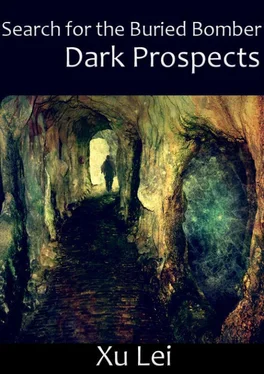This time there was no escaping it. I turned to tell some corpsmen they’d better tie some rocks to the raft anchors to weigh them down, but Chen Luohu was already instructing them. I jumped down into the water. It didn’t reach my knees, but the cold struck at my heart and seeped into my bones. I took in my surroundings: the walls were all limestone. Seeing Wang Sichuan, I walked up behind him. He was concentrating intently on one of the cliff walls. He noticed me as I walked over and motioned for me to take a look at something. I shined my flashlight on a portion of rock. The wall seemed polished, as if it were covered in a layer of wax. He then used his flashlight to point out several other spots that all bore similar markings. I stared at it for a moment, then glanced up at him, that “Now what do you think that means?” look in my eye.
“What you’re looking at is glazing,” he said quietly. “Meaning that, at some point, there was most likely a violent explosion somewhere in this cave.”

CHAPTER 7

A Few Clues
Rock glazing most commonly occurs during a volcanic eruption when rivers of lava hit masses of rock. There can be violent explosions and fires. Wang Sichuan’s inference was basically correct, but whether it was in fact an explosion or a severe fire that caused the glazing still remained to be seen. He figured it was an explosion because he knew that, as the Japanese were departing, they would have wanted to seal off the cave. The most common way armies did so was by demolishing the mountain around it. I personally believed that a prolonged fire had left the damage. With an explosion of that size, there was no way the mountain could have maintained its current form. But if it was a fire, then this cave must have been continuously scorched for over forty hours to leave such an impression. Who knows what they were burning?
We waded twice around the length of the cavern. The river didn’t keep to a consistent depth—one step might be deep and the next shallow. The bottom was covered in pebbles. Shining my flashlight in the water, I could see many small fish swimming about. Had this been in the South, it would have made an excellent place to visit during summer vacation. A pity that the North is simply too cold. Even wearing galoshes, the chill pierced my bones.
The rest of our party continued to descend one by one. Some of these were guys I knew. We exchanged cigarettes and talked about the situation in the cave. It was the corpsmen’s job to make the final preparations. There was no reason for us to interfere. We talked about the Japanese troops that had been stationed here. Back in those days, everybody had heard the rumor that Japanese soldiers who’d never withdrawn had been captured in the mountains, some of them already little more than savages. They had no idea World War II had ended. Who knew if any lived in this cave, but if some did, our situation would get a lot more interesting.
Two hours later everyone had descended into the cavern and all eight rafts—two per group—were fully inflated and ready to go. We were all feeling a little anxious. A few people kept up a nervous chatter, and the whole cave echoed with noise. Then the colonel descended into the cave. He had switched into battle garb and, seeing him like this, I realized who he was. He had been my bootcamp instructor, though he clearly no longer recognized me. He gave us a pep talk, the main point being to take care and be safe, then shouted, “Do you have what it takes to complete the mission?” We were well trained. We responded as one: “Yes!” We took a deep breath, slipped on our waterproof gear, climbed into the rafts, and with that our adventure officially began.
According to our analysis of the geological-imaging film, following this river would lead us to the plane. Of course, the river didn’t go straight down. It meandered this way and that as it flowed underground. Though its total length was impossible to pin down, it was certainly going to be more than thirty-six hundred feet.
We waited a minute after the first group’s two rafts launched before pushing off ourselves. The corpsmen rode the raft in front, their light switched on to help lead the way. We propped the oars out on either side to keep the raft from running into the cave walls. The cavern shrank and the sounds around us hushed. The light dimmed until only the boat and our most immediate surroundings were visible. Sweeping the water with our flashlights, we discovered it had already become quite deep. These changes were characteristic of tectonic caves, but here it was both sudden and very pronounced. The cave was far from wide—perhaps only thirty feet across—but it was quite tall. Though we craned our necks upward, we couldn’t make out the ceiling. It felt like floating through a deep and narrow gorge. Shining our flashlights above us, we could see the roots of plants climbing down the walls. It was a magnificent sight and we paused for a moment to take it all in. Chen Luohu even pulled out a camera and snapped two pictures using a magnesium flash.
Having floated not ninety feet farther, we reached a fork in the cave. We waited here for the last two groups, then we all went our respective ways. At last we’d entered the truly fearful portion of our journey. When it came to cave exploration, working on a fiftyperson team and a five-person team are different matters entirely.
Both rafts floated a few radio buoys beside them. If the raft ahead hit something unexpected, we’d see the movement of the light and the buoy signal would change. At least we’d know in advance that something wasn’t right. The current was still slow. As we watched the lighted buoys and the corpsmen’s raft slowly drift ahead, we relaxed and followed in the wake. The dangers of cave exploration have often been exaggerated in novels. Really, as long as you stick to the correct procedures and remain cautious and alert, it’s actually relatively safe. The greatest danger comes from the instability of the rock itself. If the cave collapses with you inside, then you’re dead. Simple as that. To see all the corpsmen up ahead—tense as could be, knuckles white, gripping their rifles—made us laugh to ourselves.
Everything went smoothly for the first four hours, and soon we’d floated over two kilometers. Then the current began to pick up. We were rushed around bends and down short staircase waterfalls. Stones had been piled below the surface, and various objects, presumably left by the Japanese, were wedged into cracks in the walls. Indistinct Japanese characters were painted on the sides of these wooden crates and rusted barrels. None of us had any idea what they were trying to tell us.
Just as our attention was being drawn by these old signs, the raft in front of us suddenly skidded to a halt. We knocked into it and one of the men perched on its side nearly fell out. Our raft spun head to tail, pressing up against the raft ahead. We couldn’t see anything from the surface. Why had we stopped? Was something hidden underwater? We swept about with our paddles, hit something, and with a good, forceful yank, pulled a sheet of wire netting from underwater.
“Damned Japs left a trap for us,” the deputy squad leader cursed. He commanded two corpsmen to hop in and cut away the rest of the netting.
The two soldiers immediately stripped off their clothing, clenched their flashlights between their teeth, and dove in, splashing us with water so cold it made us shiver. You had to admire their nerve—told to jump, they did so without a second thought.
Читать дальше














